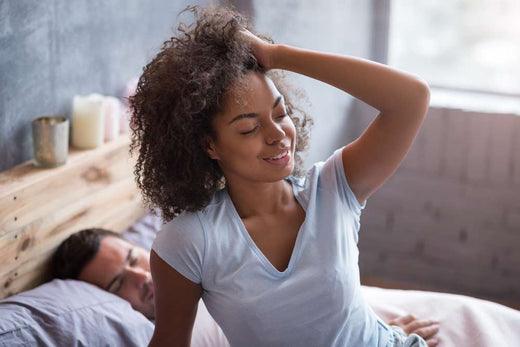
As part of World Sleep Awareness Week (official International day is the 15th March 2024), we are taking a deep dive into the topic of sleep and what helps us get a good night's kip. Many of us, can struggle to fall asleep and stay asleep most of the night. And this lack of quality sleep can negatively affect your mood, energy levels and overall well being.

What is a good night’s sleep?
Sleep is an essential aspect of our health. It is as important as nutrition and exercise, and positively contributes towards our learning ability, creativity, mood and memory. So, how do we get it? The National Sleep Foundation recommends that most adults get between 7 and 9 hours of sleep per night, whilst over 65s should be getting between 7 and 8 hours per night. During these hours your body will naturally cycle through light sleep (stages 1 & 2), to deep sleep (stage 3) and lastly to rapid eye movement sleep (REM). Any interruption to your sleep can impede your body’s ability to cycle through these stages, thereby negatively affecting your body’s restorative process.
Are you getting a good night’s sleep?
If you wake up feeling refreshed, energised and in a good mood, this is evidence of a good night’s rest. However, if you struggle to wake, focus, or can be irritable and sleepy throughout the day, it is a strong indicator that you are not getting a good quality or quantity of sleep. It could also be symptomatic of insomnia. And, before you start to think, “well, I do actually fall asleep”, insomnia can range from mild to severe - from frequently waking in the night, to waking up early and to struggling to fall asleep for hours after going to bed.
Cases of insomnia have risen dramatically in recent years. In 2018 it was recorded that 16% of adults in the UK were getting less than six hours of sleep per night.
So what can we do to help ourselves get a good night's sleep?

Make time to slow down before bed
Take time and have a hot bath. The heat will help relax your muscles and once out the bath the temperature change will encourage a feeling of sleepiness. In order to get maximum benefit and a good night's sleep, experts recommend bathing around 1-2 hours before bed.
Escape into a book for around 15-20 minutes. This will help your brain totally switch off from the day before bed allowing you to drop off to sleep without that 'busy brain' keeping you awake. If you're a phone scroller at bed time, try swapping that scroll time for book time instead. Take time to relax and unwind in bed with a warm cup of CBD tea while you read.
Be more mindful before bedtime
Yoga is a simple yet effective way to ease daily stresses and tensions. Take time out each evening to stretch and reflect on your day, so that you can feel limber and fresh in the morning. By allowing yourself this 'me-time', you are not only removing the over-stimulating effects of blue-light, but you are encouraging your body to wind down.
Bedtime is also a good time to meditate and practice mindfulness. You can take a few deeper breaths as you become more present of your body, and mindfully allow each area of your body to relax, starting from the top of your head and working your way down. 







